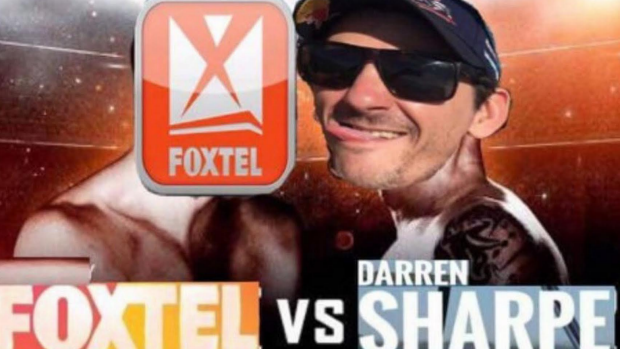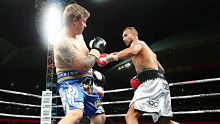Foxtel has signalled it will take legal action against an Australian man who broadcast the Danny Green v Anthony Mundine fight on his Facebook page on Friday night.
Darren Sharpe's broadcast allowed tens of thousands of viewers to watch the fight, who would otherwise have had to purchase the fight through Foxtel's pay-per-view service.
More Sports HQ Videos
Danny Green beats Anthony Mundine
Cheap shots were thrown and it was a tight fight, yet Green won via a split points decision at Adelaide Oval, exacting belated revenge for his 2006 loss to Mundine.
But the subscription service has vowed to fight back, saying in a statement "appropriate legal action will be taken."
"What occurred last night on Facebook is stealing and it's harmful to the future of boxing and live sport," the statement said.
Mr Sharpe appeared to be revelling in his online notoriety on Saturday, appreciating the support of thousands of viewers who had tuned in to his Facebook Live re-broadcast.
And in a video posted to YouTube, Mr Sharpe's conversation with a Foxtel representative on Friday night telling him to stop the broadcast is apparently recorded.
"I want you to stop streaming it on Facebook," the representative says.
"Mate I've got 78,000 viewers here that aren't going to be happy with you mate," Mr Sharpe responds.

"It's an offence against the Copyright Act of Australia mate," says the representative.
"I don't think I can stop streaming mate," Mr Sharpe says. "There's people all over the world watching this."

On his Facebook page, Mr Sharpe has linked to a website to raise funds in case he is sued by Foxtel.
"Please donate in case I end up getting sued haha if not and I Foxtel doesn't rekt me I'll donate to cancer council cheers everyone your the best," the website says.
The fight had a one-off pay-per-view cost of $59.95.
Mr Sharpe, whose online biography says he is a Brisbane mechanic, posted on Facebook on Saturday that he hoped everyone had enjoyed the previous night.
Fiona Phillips, the chief executive officer, of the Australian Copyright Council, said both Mr Sharpe and Facebook could face penalties over the broadcast.
"The thing to remember is that sports organisations generally fund their sport through broadcast rights," said Ms Phillips.
Mr Sharpe, she said, could be liable for both civil and criminal sanctions under the Copyright Act. Criminal penalties can include fines or imprisonment.
"The guy would have primary liability but really if I was Foxtel I would be more interested in the platform that was facilitating the distribution of the content," said Ms Phillips.
Facebook would rely on its terms and conditions that limited its liability for breaches of Copyright. But there would be an argument that the social media platform facilitated the breach.
On Saturday afternoon, Mr Sharpe said he had not expected the broadcast to "blow up" and that he "wouldn't mind another conversation to settle any issues."
Matthew Rimmer, a professor in intellectual property at the Queensland University of Technology, said legal conflicts over the broadcasting of sport had a long history in Australia, dating to the 1937 High Court case of Victoria Park Racing & Recreation Grounds v Taylor. In that case, a radio station built a platform outside the grounds a call from which to see and broadcast a call of the races.
Professor Rimmer said Facebook and other social media intermediaries would be coming under increasing pressure from copyright owners to come up with technical solutions to prevent unauthorised broadcasts.
"It is a perennial battle, and it is a real clash clash of different technological ages," he said.
"In Australia broadest copyright developed in an age of mass media and enabled very tight geographical and temporal distinctions that enabled broadcasters to cut up when they were showing things."
Social media, by contrast, breaks down those distinctions.
"In some ways I'm surprised that Foxtel hasn't taken on the big social media entities like Facebook yet," Professor Rimmer said.
Sara Delpopolo, the principal of Axis Legal, a firm that focuses on digital media and intellectual property, said Foxtel could find itself in a difficult situation. On the one hand, it could face an online backlash should it pursue Mr Sharpe.
"But there's a danger that if they don't take action it's pretty much opening a floodgate," said Ms Delpopolo.
"I think that these sorts of issues are just going to become more and more prevalent," she said.
The Foxtel spokesman said in a statement that the subscriptions to the Green v Mundine match were restricted to individual residential use, and not authorised for rebroadcast.
A spokesman for Facebook referred Fairfax Media to a blog post written last year. The post says that as more people watch and share live video on the platform, Facebook takes steps to ensure its "rights manager" protects live video streams.
"We check every Facebook Live video stream against files in the Rights Manager reference library, and if a match surfaces, we'll interrupt that live video," it says.
"Video publishers and media companies can also provide reference streams of live content so that we can check live video on Facebook against those reference streams in real time."













